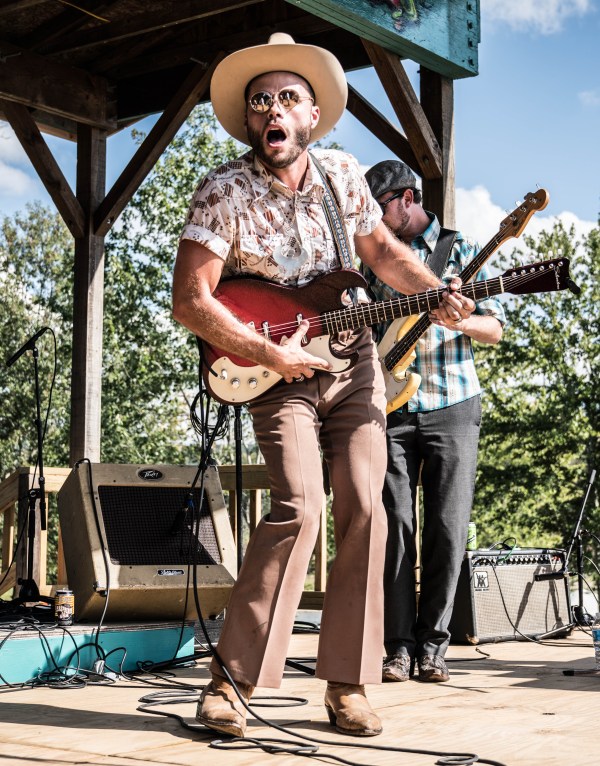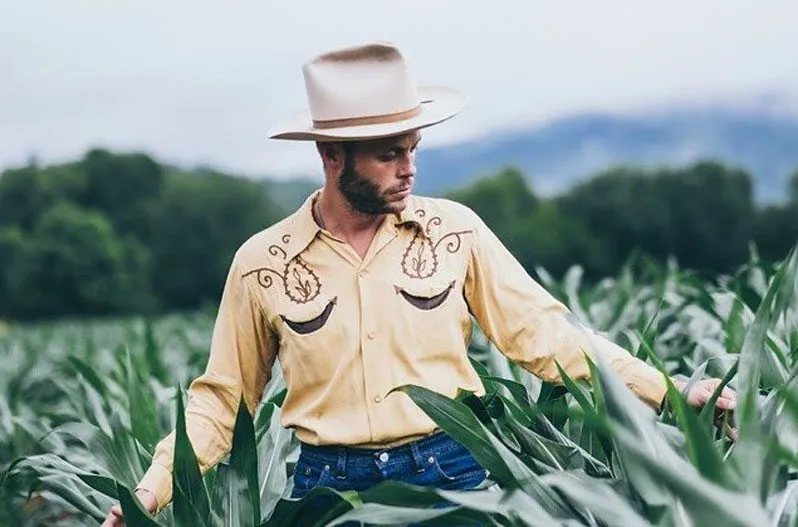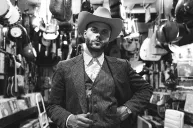[dropcap]T[/dropcap]exas roots artist Charley Crockett delivers a history lesson with the release of his third album, Lil G.L.'s Honky Tonk Jubilee. The Dallas-based Crockett is as well versed in honky-tonking tearjerkers, Delta blues, and Cajun soul as they come. With Honky Tonk Jubilee, he tosses a pocketful of quarters into an old-school jukebox packed with American standards that sound as timeless as they do refreshing.
Videos by Wide Open Country
"My vocabulary is all that traditional music," Crockett tells Wide Open Country. "I wanted to show young people good new versions of those songs."

Charley Crockett performs at Medicine Stone. Photo: Tim Castleman
Roots & Heritage
Growing up, Crockett, who's a direct descendant of American folk hero Davy Crockett, split his early years between Texas and Louisiana with his blues singing mother in Dallas and an uncle who would introduce him to the rich music echoing throughout New Orleans' French Quarter. They would lay the foundation of Crockett's education in country blues, Southern soul, R&B and Cajun jazz.
Shortly thereafter, Crockett would set off on his own journey that would take him to busking on train cars of New York City, the streets of Paris, up and down the West Coast and even to the northern shores of Africa. With each stop, he'd hone his craft of well-aged storytelling and the art of performance. With that experience, Crockett hasn't just learned these songs; he's lived them.
"I've been on the streets for a long time. You get this mix of old-school New Orleans blues and folk to these old-school drinking honky-tonk songs," says Crockett with his distinct Southern drawl. "As much as you love hearing an old honky-tonk song, I love playing it just as much. They're just satisfying story songs that say all they need to say in just a few minutes."
Honky Tonk Jubilee isn't just a paint-by-numbers homage or an attempt to score points as a nostalgic novelty. With songs by Hank Williams, Ernest Tubb, George Jones, Loretta Lynn and more, Crockett's collection successfully showcases the honky-tonk heroes who've influenced Crockett's rare and refined blend of American heritage music.
"All the old heads would tell us, it doesn't matter what kind of music you're into if you want to make good music, learning to play traditional music is only going to contribute to what you want to do," says Crockett. "It's going to make you better."
Recording a Classic Country Crooner
Crockett's interpretation of these jukebox standards blends the old-school durability and lived-in comfort they're known for while adding a stylish fit for the modern era.
To capture Honky Tonk Jubilee, Crockett and company recorded the album at Billy Horton's Fort Horton's Studios outside of Austin. Horton, who's known for primarily recording with rockabilly blues and western swing acts, was just what Crockett needed as an experienced engineer and co-producer.
"He has this super old-school studio with old microphones. We just cut it up live," says Crockett. "We did everything live with a three-piece and then went in and overdubbed the pedal steel and some fiddle." The lone room and vintage microphones provided all the ambiance Crockett needed to morph into a '50s country crooner.
Fellow country troubadour Brennen Leigh, who Crockett admirably calls "the greatest honky-tonking girl you can find," not only contributed harmony vocals throughout but her song "You Must Be Drunk Again" is the only new song included on the otherwise all classic tracklist. Still, it feels right at home among the Hank Williams standards and sad country heartbreakers of yesteryear.
Pushing Forward & Looking Back
While Crockett is continually looking further and further back, searching for more fabric for America's music quilt, he still has a pulse on current music trends. His previous albums, A Stolen Jewel and In the Night, have been gusts of fresh air that blended his rootsy country and blues tradition with R&B with a contemporary edge.
"It's a unique era where you have access to both. I was just as influenced by hip-hop as I was by brass bands, honky-tonk drinking songs and delta blues," says Crockett. "I used to play in train cars in New York City. We used to take traditional jazz songs we had learned on the streets of New Orleans and we would do that with hip-hop cats who were freestyling on the train. In New York City, that combination, it'd win everybody over. The old folks loved that classic music while the young folks loved that freestyling hip-hop."
Like Valerie June, The Roots, Alabama Shakes, Paul Cauthen and Leon Bridges, Crockett has a unique style of both rural and urban American music, heritage and experiences.
"All rock and roll was, is when the country boys went to the city," says Crockett. "I think I'm that. I'm from both the city and the country."




